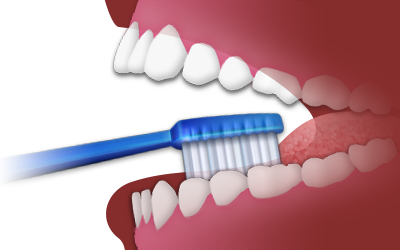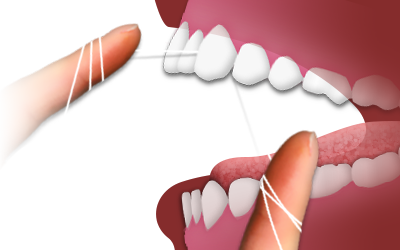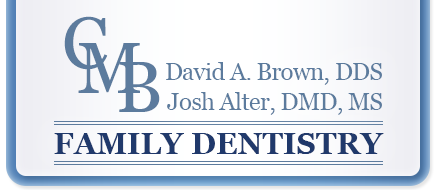Oral Health
Tooth Decay Prevention
Regular Dental Visits
In order to maintain a healthy smile, it is vital to have professional cleanings and regular check-ups. Therefore, you should visit your dentist twice a year (once every six months). At each appointment, we will examine your teeth, gums and oral structures, providing an evaluation of existing dental problems and proposed treatment. At CMB Family Dentistry in Broomall PA we pride ourselves on conservative and preventative treatment, knowing that nothing functions better that your natural teeth.
Diet Control
Sugar + Acid = Cavities
Did you know that it takes your mouth 45 minutes to fully recover and neutralize acids and sugars from your diet? If you have a can of soda at your desk, a bottle of iced tea in your truck, or a bag of candy at your workstation, re-set the clock 45 minutes after every sip or bite you take. If you are sipping or nibbling that sugary and acidic beverage or food (most sodas, candies, citrus and citrus juices, sports drinks, or even bottles of water with lemon slices, etc.) throughout the day you are keeping your mouth in an acidic environment for a prolonged period of time. This give cavities an optimal environment to form and progress. So, what can you do to help your mouth return to a neutral state? If you cannot stop consuming these foods, limit the frequency and time in which you consume them. Do not sip that soda or tea throughout the day, consume it "quickly" in one sitting. Also, once done, rinse with water and spit out, DO NOT BRUSH, as brushing right after consuming these foods can brush away softened enamel. If left alone, enamel softened by sugars and acids with re-mineralize and harden again (45 minutes after your last sip or bite), but if you brush softened enamel away it will not grow back.
Additionally your biology and genetics can predispose you to a naturally occurring acidic saliva. If it seems that every time you visit a dentist you have cavities check out Dr. Brown's holistic advice to naturally and inexpensively naturalize acids in your mouth.
Fluoride
Fluoride is a substance that helps teeth become stronger and resistant to decay. Fluoride from the environment, daily brushing with fluoride toothpaste, and flossing ensures significantly fewer cavities. Public water fluoridation, when introduced, became one of the most effective ways to reduce cavities in a community. Unfortunately in Pennsylvania, only Philadelphia and Pittsburgh counties and the surrounding areas that draw water from their sources are fluoridated. If you live in Delaware, Chester, Montgomery, and Bucks counties, your water is not fluoridated. If you seem to be at a higher risk for developing cavities we can suggest and even prescribe some techniques to make common brushing and flossing and the fluoride you get from those products more effective.
Brushing and Flossing
The cornerstone to a good at-home oral hygiene regimen is proper brushing and flossing. Practicing excellent dental hygiene avoids unhealthy teeth and costly dental treatments.
Brushing
 Use a toothbrush with soft or extra soft bristles and a small strip of fluoride toothpaste. When you brush your teeth, move the brush in small, circular motions to reach food particles that may be under your gum line. Hold the toothbrush at a 45 degree angle towards the gums and brush slowly and carefully, using only enough pressure that would break the point of a lead pencil. Studies have shown that it takes brushing for a full 2 minutes to effectively clean your teeth. Be sure to brush your tongue and the roof of your mouth before you rinse as the bacteria that cause bad breath populate these areas as well.
Use a toothbrush with soft or extra soft bristles and a small strip of fluoride toothpaste. When you brush your teeth, move the brush in small, circular motions to reach food particles that may be under your gum line. Hold the toothbrush at a 45 degree angle towards the gums and brush slowly and carefully, using only enough pressure that would break the point of a lead pencil. Studies have shown that it takes brushing for a full 2 minutes to effectively clean your teeth. Be sure to brush your tongue and the roof of your mouth before you rinse as the bacteria that cause bad breath populate these areas as well.
Brush your teeth at least twice daily to avoid the accumulation of food particles and plaque. The most important times to brush are in the morning and right before you go to bed at night.
Flossing
 For areas between the teeth that a toothbrush can't reach, dental floss is used to remove food particles and plaque. The ADA recommends flossing one time per day.
For areas between the teeth that a toothbrush can't reach, dental floss is used to remove food particles and plaque. The ADA recommends flossing one time per day.
Pull a small length of floss from the dispenser. Wrap the ends of the floss tightly around your middle fingers. Guide the floss between all teeth to the gum line, pulling out any food particles or plaque. Unwrap clean floss from around your fingers as you go so that you have used the floss from beginning to end when you finish. Floss behind all of your back teeth.
Floss at night to make sure your teeth are clean before you go to bed. When you first begin flossing, your gums may bleed. If you stick to a strict one time a day flossing routine at the end of one week of flossing bleeding from your gums will be significantly decreased.
Oral Hygiene
Practicing excellent oral hygiene is the key to maintaining good overall health - for patients of all ages! Parents must introduce proper oral care early in a child's life, as early as infancy. Parents are responsible for ensuring their children brush and floss every day, and we encourage them to lead by example.
In recent years, bacterial inflammation associated with gum disease has been linked to chronic health problems, such as stroke, coronary artery disease and premature, low birth-weight babies. Yet there are a number of things you can do to help protect your teeth and your overall health. Visiting your dentist at least twice a year allows us to thoroughly clean your teeth, and dental exams give us the ability to evaluate any potential problems (i.e. cavities, gingivitis, etc.) before they become more serious. We are also able to recognize whether a patient is getting proper nutrition, maintaining a proper oral hygiene regimen and whether there are any growth or development problems.
To ensure you and your family are practicing good oral hygiene at home, be sure to:
- Brush at least three times a day using a fluoridated toothpaste
- Floss daily
- Eat a well-balanced, healthy diet
- Stop smoking
- Discontinue the use of smokeless tobacco products
By following these steps, you can help prevent common problems, such as cavities, gingivitis, gum disease, oral cancer, as well as prohibit the development of more serious diseases that affect your overall health, including heart disease and diabetes.
